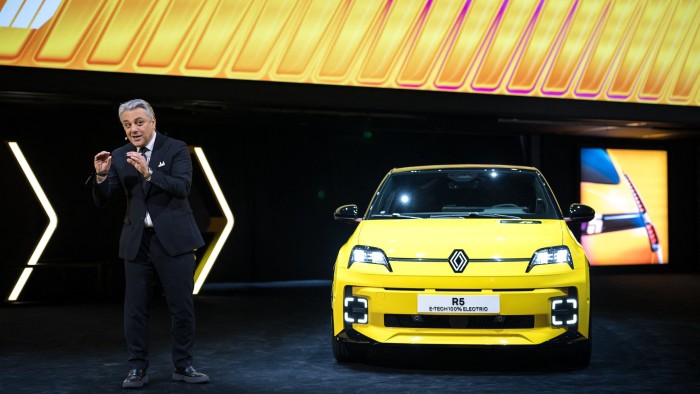The turmoil caused by Donald Trump’s trade policies has ensnared the entire automotive industry except for one smaller player: France’s Renault.
Having emerged from a five-year turnaround under boss Luca de Meo and with hardly any US sales, Renault is insulated — at least for now — from the 25 per cent tariff Trump has imposed on all vehicles imported to the US.
“I had so many miseries as a Renault CEO in the last four years but at least, in this case, I don’t have to be the first one to be worried,” De Meo said in an interview held before the US president’s tariffs were announced.
However, analysts and company insiders say a broader market slowdown caused by the tariff chaos could hurt de Meo’s plans to further expand Renault’s share in electric vehicles as well as hybrids.
“In the storm, we’re doing pretty well but we’ll see what the boat looks like afterwards. The storm is tough,” said one company insider.
Trump’s sweeping tariffs on vehicles and car components have disrupted supply chains, hurting many big players including Toyota, Volkswagen, General Motors and Hyundai.
Stephen Reitman, analyst at Bernstein, said Renault was among the best insulated from the tariff uncertainty, although that would not be the case in “a generalised market meltdown”.
Under De Meo’s leadership Renault has strengthened its cost structure and revamped models, with the help of former PSA engineering director Gilles le Borgne.

It has kept its overall manufacturing capacity and geographical footprint at a smaller scale compared to some other automakers, producing fewer cars at higher margins. This has been validated at a time when its larger European rivals Stellantis and Volkswagen have been hit by pressures in China and the US.
However, despite having close to zero sales in the US, Renault has not been immune to concerns about a global slowdown and the tariff impact on car demand, with its share price falling by 9 per cent over the past five days.
Having completed its restructuring, De Meo wants to boost the EV share of Renault’s sales from about 12 to 20 per cent, while also closing the gap with Toyota in the European hybrid market. The Japanese carmaker has a 48 per cent market share in the region, compared to Renault’s 20 per cent.
“My ambition is to make sure that Renault can play in the finals of the Champions League, because I think we have the capacity and we have the resources,” de Meo said, referring to Europe’s club football competition.
It also reworked its 25-year alliance with Nissan in 2023 and is on a path to reducing its stake in its troubled Japanese partner, once as high as 43 per cent, to 10 per cent. It currently holds 36 per cent, including a now 18.7 per cent stake held in a French trust it wants to offload.
One banker to the sector said he did not expect Renault to rush into selling the stake, especially after merger talks between Nissan and Honda collapsed. Nissan’s share price has also plunged 35 per cent this year under the threat of tariffs, making selling unattractive.
But despite its insulation from the US, industry observers question how long it can defy a fall in demand for new vehicles in Europe, a region that accounts for two-thirds of sales.
While “it’s been a great, multiyear turnaround . . . going from a loss to a 7.5 per cent margin, that part of the story has run its course”, Jefferies analyst Philippe Houchois said in a video to clients as the brokerage downgraded its rating on Renault from buy to hold.
De Meo is due to outline a new growth strategy this year which is likely to focus on investing in technology and innovation, and expanding Renault’s business into areas “adjacent” to cars, such as software and finance.
It is also leaning on partnerships to compensate for its lack of scale. To address rising competition in China, Renault has partnered with Geely on a combustion-engine business and also has collaborations in South Korea and Brazil.
But key to future growth will be improving sales of its EV range. Renault’s robust results have been driven by strong sales and margins from its low-cost, largely combustion engine Dacia brand; hybrid sales also rose 45 per cent last year to make up a quarter of sales — however, its fully electric vehicles sold poorly last year.
EV sales dropped about 20 per cent to make up just 9 per cent of the group total as older models were withdrawn ahead of the launch of new models such as the R5.

This came as part of a broader slowdown in the European market, which is now showing signs of a recovery. In the first two months of the year, sales of battery vehicles rose 28 per cent from a year earlier, capturing 15 per cent of new-car sales, according to Acea.
On a recent visit to the company’s plant in Douai, northern France, now solely focused on electric models, De Meo said it was “the heart of the battle” for the carmaker’s future.
The factory will pump out models of the new R5 E-Tech as it launches across Europe in the coming months. Renault is also planning a new EV from Dacia and a more affordable version of the R5.

The R5 is the tenth most-sold French car in the first three months of the year, and analysts at HSBC noted that the company has had strong orders from launches at the end of 2024.
But with a fresh product portfolio, the carmaker must continue to convince customers to buy its new electric ranges, a task made more difficult with tariffs expected to slow the global economy and raise vehicle prices.
“We need to see Europeans being a bit more convinced by the idea of buying more electric cars,” he said in Douai. “But we’re playing to win, not to lose.”


